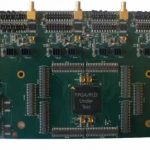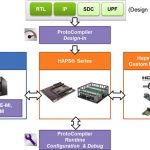Vector blasting hardware is as old as digital test methodology itself. In the days of relatively simple combinational and finite state machine logic, a set of vectors aimed broadside at inputs could shake loose most faults with observable outputs. With FPGAs, creating an effective set of artificial test vectors has become a lot… Read More
Xilinx has the Power Advantage over Altera
I thought I write about one of the most important subjects in FPGAs, that is power. Power of course is not just based on node size, and it is funny why so many people are concerned about node size. If not just as important is the architectural decisions that drive down power. Do you really care if your part is 16nm or 14nm? Or do you care more… Read More
A Brief History of QuickLogic
Quicklogic was founded in 1988 as a fables semiconductor company supplying anti-fuse devices. In fact VLSI Technology, where I was working at the time, was their foundry.
Although today anti-fuse is often used as a generic word for one-time-programmability, the origins of the name are grounded in reality. In a fuse, like the things… Read More
Xilinx KCU105 Evaluation board is key for your demo
I love God, my wife, kids, and FPGA boards. I know I am not alone, there are other nerds out there, don’t be shy. Friday my “Kintex® UltraScale™ FPGA KCU105 Evaluation Kit” came in. Think about this, this is real 20nm Xilinx FPGA hardware that really works. Below is a nice picture of all the swizzles the board has.
I believe this is the … Read More
Sensor Hub and Wearable Gestures
One of the challenges with the internet of things (IoT) is that many devices are both always on and battery powered (and not with a large battery). The responsibilities need to be split so that the device senses when it needs to wake up without requiring the application processor to be waking up all the time to make the decision since… Read More
Softly Defined Networks
Software defined networks were a technique developed around 6 years ago. The original structure of IP based network scaled by using additional routers that would forward packets based on partial information about the network topology. Inside each router was a dataplane, where the packets themselves flowed through, and a control… Read More
Secret to Beating Your FPGA Competitor’s Design
Can I ask you a personal question dear reader? It is only fair, you know so much about me and all, so here goes… Why are you still hand coding you’re FPGA design? Surely you are not hand coding interfaces, like PCie, SRIO, DDR, GbE, JESD204B, HMC etc… Correct? OK, why then are you still hand coding the guts of the world’s best, super-duper… Read More
More knowledge, less time in FPGA-based prototyping
I recently published a post on LinkedIn titled “Sometimes, you gotta throw it all out” in reference to the innovation process and getting beyond good to better. A prime example has crossed my desk: the new ProtoCompiler software for Synopsys HAPS FPGA-based prototyping systems.
Last week, I spoke with Troy Scott, product marketing… Read More
Xilinx Quarterly Results: 20nm Prototypes
Xilinx announced their quarterly results last week. Because of their financial year not being aligned with their calendar year this is actually 4th quarter of their 2014 financial year. New Year’s Eve 2015 comes early for Xilinx. The results were very good. As Moshe Gavrielov, the CEO, said on the conference call:Xilinx… Read More
Xilinx Showcases Worlds First ‘High Performance’ Analogue FPGA
Last February Xilinx presented a prototype device at the 2014 IEEE international Solid-State Circuits Conference (ISSCC, titled “A Heterogeneous 3D-IC Consisting of Two 28nm FPGA Die and 32 Reconfigurable High-Performance Data Converters” and click here to get a copy of the paper. Let me just share the intro my dear reader… … Read More




The Name Changes but the Vision Remains the Same – ESD Alliance Through the Years